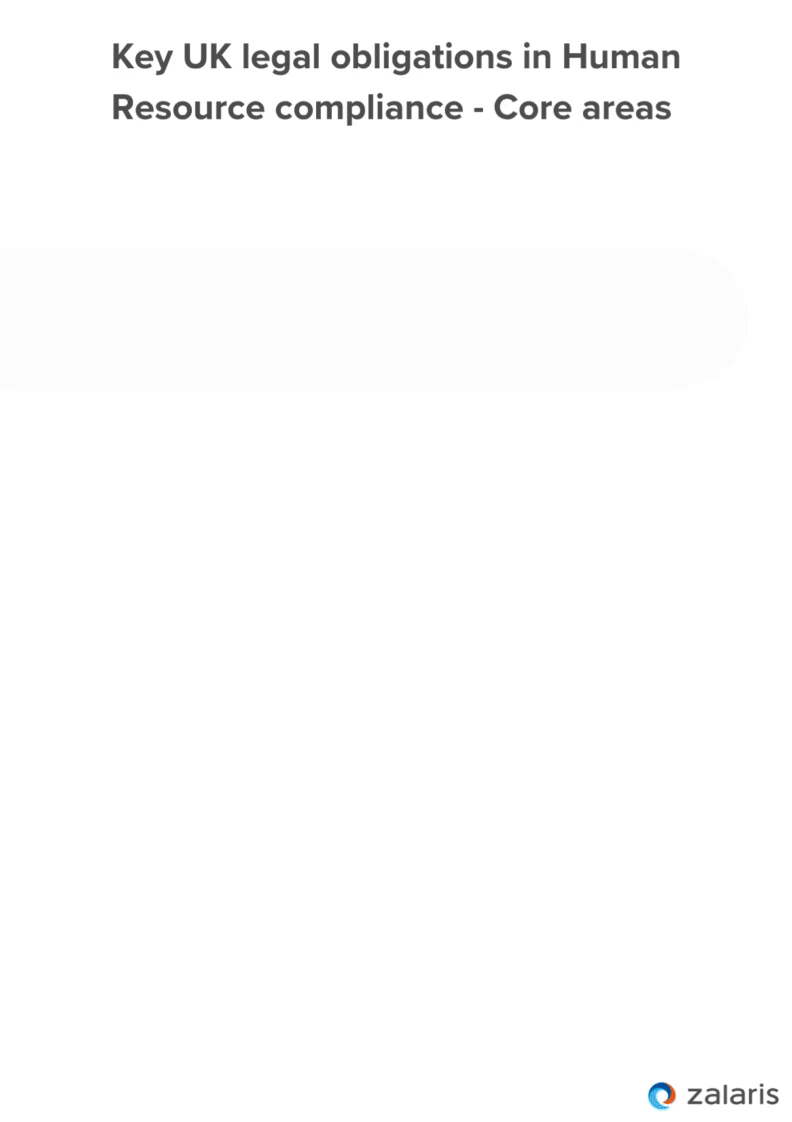Failure to stay aligned isn’t just a legal issue — it can undermine payroll accuracy, erode employee trust, and stall global expansion plans. Navigating a patchwork of labour laws, data protection rules, and employment practices that vary not only by country but often by region or sector is now a strategic imperative.
This guide offers practical insight into HR compliance, the legal areas organisations must manage globally, and how to strengthen compliance through digital transformation. Whether operating in one country or across many, the goal is the same: to stay compliant, consistent, and confident.
What is HR compliance, and why is it important?
Human Resource compliance refers to aligning human resource policies, processes, and systems with applicable labour laws, data privacy regulations, and industry standards. This covers areas including employment contracts, compensation, working conditions, workplace safety, and personal data handling.
Effective HR compliance is critical for mitigating legal risks and fostering a fair, transparent workplace. For instance, in 2024, a fashion retailer lost a six-year legal battle over equal pay and had to pay over £30 million in compensation. Conversely, organisations that proactively manage HR compliance can achieve operational efficiencies and bolster their reputation.
Beyond legal and financial protection, strong compliance in HR also enhances employee trust and engagement. When staff see that policies are consistently applied and grievances are handled fairly, it reinforces a culture of accountability and respect. In competitive labour markets, a reputation for ethical practices and legal integrity can also serve as a differentiator in attracting and retaining top talent. Moreover, compliance ensures organisational resilience—helping businesses adapt more quickly to regulatory changes, social expectations, and evolving workplace norms.
Key UK legal obligations in Human Resource compliance
Understanding HR compliance starts with identifying the key areas where legal obligations apply. These foundational elements help ensure fair treatment, legal integrity, and operational efficiency across the workforce.
Core areas
Human Resource compliance in the UK involves navigating several core legal areas that every organisation must address to avoid legal pitfalls and ensure smooth operations.
Read more on the topic
Key UK regulations
Several UK laws govern these core compliance areas, placing specific responsibilities on HR teams and making it essential to regularly review and update processes, contracts, and data systems.
UK GDPR (General Data Protection Regulation)
Organisations must handle employee data lawfully, transparently, and securely. HR teams ensure limited data access, retention policies are followed, and employees are informed of their rights. Missteps in processing or storing personal data can result in severe penalties under the Data Protection Act 2018. The Information Commissioner’s Office (ICO) has the authority to issue fines that can climb up to £17.5 million for serious infringements. Beyond financial penalties, non-compliance can result in enforcement notices and reputational harm that can damage organisational growth.
Employment Rights Act 1996
This legislation outlines the minimum rights of employees, including the right to a written statement of employment particulars, which must be provided on or before the first working day. It also governs terms such as notice periods, redundancy pay, and protection against unfair dismissal.
Working Time Regulations 1998
These regulations set limits on working hours and entitlements for rest breaks and paid leave. Organisations must monitor working patterns to ensure compliance, particularly for shift workers, part-time staff, and remote employees.
Common HR compliance pitfalls to avoid
Even with well-structured policies and good intentions, HR teams often face hidden compliance risks. Gaps in documentation, outdated systems, or overlooked legal duties can easily lead to unintentional breaches — and costly consequences. The following pitfalls not only carry financial risk, but can also damage organisational credibility:
Inaccurate, delayed, or missing employee contracts
Failing to issue contracts or written particulars on time is a common compliance violation. In the UK, this must be done on or before the first day of employment. Between April 2023 and March 2024, there were 97,958 employee-led ACAS early conciliation cases, indicating a steady rise in employment disputes during this period.
Inadequate tracking of working hours and leave
The Working Time Regulations 1998 require clear tracking of hours, rest breaks, and paid leave. In 2023/24, an estimated 33.7 million working days were lost due to self-reported work-related ill health or injury, with 16.4 million of those days attributed to stress, depression, or anxiety.
Poor handling of employee data
With UK GDPR enforcement in full effect, mishandling personal data can result in financial penalties and employee claims. These penalties can be up to £8.7 million or 2% of annual global turnover (whichever is higher) or up to £17.5 million or 4% of annual global turnover (whichever is higher) for more severe infringements.
Over-reliance on outdated processes
Managing compliance via spreadsheets or paper records increases the likelihood of omissions and errors. These formats are also difficult to audit, particularly across multi-site or hybrid teams. According to PwC’s Global Compliance Survey 2025, many compliance and risk leaders have had to build new capabilities to respond to increasingly interconnected risks, highlighting the challenges posed by outdated systems.
Failure to ensure non-discriminatory practices
Compliance in HR extends to equality in hiring, promotion, and workplace treatment. In 2023/24, there were 270 discrimination cases where compensation was awarded, with the maximum amount awarded (£995,000) in the Sex Discrimination jurisdiction.
HR compliance checklist: How to stay on track
To help assess current practices, organisations can use the following checklist that outlines the key indicators of a compliant HR function:
- Written employment contracts issued on or before the first working day
- Processes in place to review and update contracts when roles change
- Clear policies on working hours, leave entitlements, and rest breaks
- Secure, centralised time and attendance records
- GDPR-compliant data handling policies, including access restrictions and retention rules
- Documented grievance, disciplinary, and equality procedures
- Regular internal audits of HR processes and systems
- Staff and manager training on compliance topics, including data protection, workplace conduct, and antidiscrimination
Additionally, establishing a compliance calendar, assigning ownership for each regulatory area, and providing regular training for line managers can significantly reduce risk. Organisations that document policies clearly and maintain version-controlled records are better prepared for audits, internal reviews, and legislative changes.
Implementing automated compliance checks within HR systems — such as flagging outdated contracts or tracking training completion — can help identify and rectify discrepancies early. This reduces manual workloads, and ensures readiness for external audits. Such proactive measures not only safeguard against legal pitfalls but also contribute to a positive employer brand, aiding in talent attraction and retention.
Leveraging technology for compliance in HR
Technology is transforming how HR teams manage compliance. The manual tracking of obligations increases the risk of errors, missed deadlines, and non-compliance. Digital HR platforms, however, streamline processes, mitigate these risks, and provide better visibility into compliance efforts.
Key benefits of digitalisation for risk reduction include:
- Automated workflows for contract generation & policy distribution: Minimises the risk of missing key documents or deadlines, ensuring that employees receive and acknowledge important compliance materials on time.
- Integrated time and attendance systems: Reduces the risk of non-compliance with working time regulations by automating the tracking of working hours, overtime, and rest periods, and aligning them with legal limits across regions.
- Cloud-based data management: Enhances data security and reduces the risk of data breaches by providing secure, access-controlled storage that ensures compliance with data residency, retention, and GDPR requirements.
- Real-time compliance dashboards: Mitigate audit risks by enabling HR leaders to track compliance status, monitor missing documents, and proactively address potential issues before they escalate into costly non-compliance.
These risk-reducing benefits are even greater for multinational companies. A single, scalable HR platform ensures consistency in compliance practices while offering the flexibility needed to meet local regulations. Platforms like SAP SuccessFactors, implemented and supported by Zalaris, provide automation, flexibility, and built-in compliance features to safeguard against legal and regulatory risks in multiple countries.
Navigate HR compliance with clarity and confidence
HR compliance is no longer just a back-office function. It’s a business-critical component that shapes employee trust, regulatory reputation, and strategic readiness. By embedding compliance into everyday processes and digital infrastructure, organisations reduce risk and gain operational clarity across all levels of the workforce.
At Zalaris, we empower organisations to achieve end-to-end HR compliance through fully managed payroll, HR technology, and advisory services. These are tailored to local requirements and scalable across borders. From automating employment contracts and policy rollouts to managing secure data flows and monitoring time and attendance, our comprehensive HR solutions simplify complexity at every stage of the employee lifecycle.
Built on leading platforms like SAP SuccessFactors, our offerings are designed for seamless integration, regulatory alignment, and enterprise-grade security. Whether supporting a single-country HR team or a multi-market operation, we provide the tools, expertise, and infrastructure to stay compliant and confident, even as rules evolve.
Compliance isn’t optional. It’s a strategic advantage that could mean the difference between thriving and falling behind. Book a consultation today to explore how we can transform your organisation’s Human Resource compliance into a source of strength and certainty.



